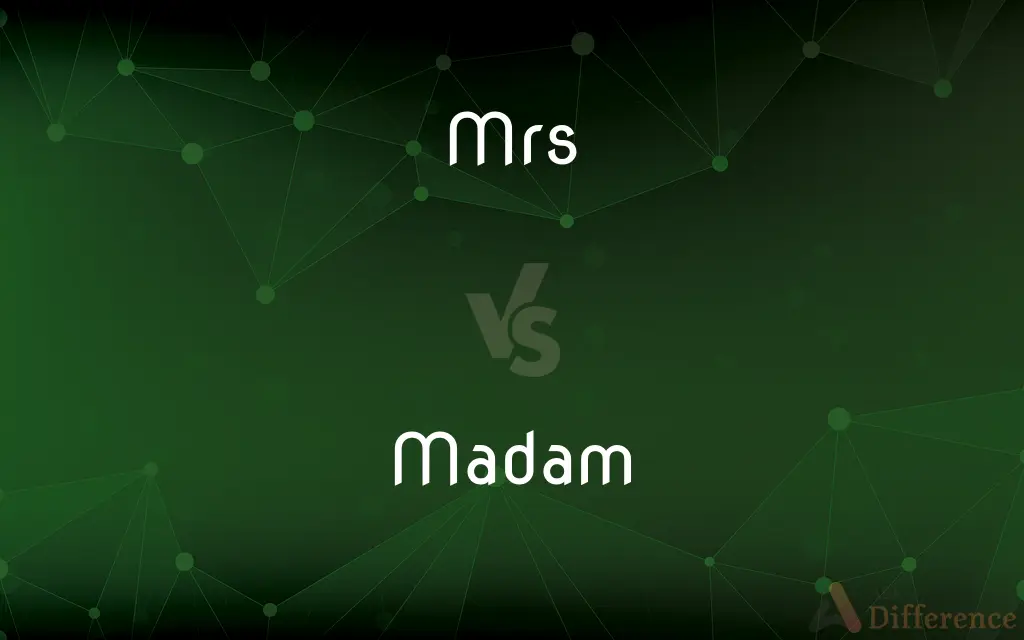Mrs vs. Madam — What's the Difference?
By Fiza Rafique & Urooj Arif — Updated on April 7, 2024
Mrs. is used to address a married woman, while Madam is a polite form of address for women, regardless of marital status.

Difference Between Mrs and Madam
Table of Contents
ADVERTISEMENT
Key Differences
Mrs. is a title used before a surname or full name of a married woman, indicating her marital status. On the other hand, Madam (often abbreviated as Mdm) is a respectful way to address women, especially when their marital status is unknown or irrelevant. This distinction is significant in formal and social situations, where addressing someone correctly conveys respect and etiquette.
While Mrs. is primarily used in English-speaking countries to denote a married woman, often preceding her husband's surname, Madam is a more universal term used in various contexts worldwide. It can denote respect, authority, or a formal mode of address in business and social interactions. Madam is also used before the name of a female in a position of authority or in professional settings, irrespective of her marital status.
In historical and societal contexts, Mrs. has been used to signify a woman's association with her husband, reflecting traditional views on marriage and gender roles. Whereas Madam has roots in higher social ranks and formal settings, serving as a title for women in positions of power or who own businesses, like in the phrase "Madam President" or "Madam Chairwoman."
Cultural variations also play a role in how these titles are used. In some cultures, Mrs. is strictly used for married women, while in others, Madam is preferred in professional and formal situations as a neutral, respectful term that doesn’t imply marital status.
Moreover, the evolution of social attitudes toward marriage and gender has influenced the use of Mrs. and Madam. Today, Madam is often seen as more inclusive and adaptable, catering to the modern emphasis on individual identity and professionalism over marital status.
ADVERTISEMENT
Comparison Chart
Usage
Denotes a married woman.
Polite form of address for women.
Marital Implication
Indicates the woman is married.
No marital implication.
Context
English-speaking countries, formal.
Broadly used, including in professional settings.
Historical Connotation
Associated with husband's surname.
Associated with respect and authority.
Cultural Variance
Strictly for married women in some cultures.
Used universally, irrespective of marital status.
Compare with Definitions
Mrs
Traditional use.
Mrs. was traditionally used to denote a woman's marital status.
Madam
Formal settings.
Please, Madam, after you.
Mrs
Married woman.
Mrs. Smith prefers to be addressed by her married name.
Madam
Universal application.
Madam is used worldwide, regardless of marital status.
Mrs
Formal address.
Invitations were addressed to Mrs. John Doe.
Madam
Respectful address.
Madam Chair, may I speak?
Mrs
Social context.
Mrs. is often used in social settings to signify a married woman.
Madam
Authority or business.
The business is owned by Madam Boucher.
Mrs
Cultural indication.
In many cultures, Mrs. indicates a woman's transition into married life.
Madam
Gender-neutral respect.
In letters, Dear Madam/Sir is often used.
Mrs
The title used before a surname or full name to address or refer to a married woman without a higher or honorific or professional title
Mrs Sally Jones
Madam
Madam (), or madame ( or ), is a polite and formal form of address for women, often contracted to ma'am (pronounced in American English and in British English). The term derives from the French madame (French pronunciation: [maˈdam]); in French, ma dame literally means "my lady".
Mrs
Used as a courtesy title for a married, widowed, or divorced woman before her own surname or full name
Mrs. Doe.
Mrs. Jane Doe. See Usage Note at miss2.
Madam
Pl. Mes·dames (mā-dăm, -däm) Used formerly as a courtesy title before a woman's given name but now used only before a surname or title indicating rank or office
Madam Ambassador.
Mrs
Used as a courtesy title for a married or widowed woman before the surname or full name of her husband
Mrs. Doe.
Mrs. John Doe.
Madam
Used as a salutation in a letter
Dear Madam or Sir.
Mrs
Used in informal titles for a married woman to indicate the epitomizing of an attribute or activity
Mrs. Wonderful.
Mrs. Organization.
Madam
Madam Used as a form of polite address for a woman
Right this way, madam.
Mrs
A form of address for a married woman
Madam
Madam The mistress of a household.
Madam
Madam A woman who manages a brothel.
Madam
A polite form of address for a woman or lady.
Mrs Grey wondered if the outfit she was trying on made her look fat. The sales assistant just said, “It suits you, madam”.
Later, Mrs Grey was sitting in her favourite tea shop. “Would madam like the usual cream cakes and patisserie with her tea?” the waitress asked.
Madam
The mistress of a household.
Madam
(colloquial) A conceited or quarrelsome girl.
Selina kept pushing and shoving during musical chairs. The nursery school teacher said she was a bad-tempered little madam.
Madam
(slang) A woman who runs a brothel, particularly one that specializes in finding prostitutes for rich and important clients.
After she grew too old to work as a prostitute, she became a madam.
Madam
An irritable, conceited, or contemptous woman. (used as a general term of abuse).
Madam
(transitive) To address as "madam".
Madam
A gentlewoman; - an appellation or courteous form of address given to a lady, especially an elderly or a married lady; - much used in the address, at the beginning of a letter, to a woman. The corresponding word in addressing a man is Sir; often abbreviated ma'am when used as a term of address.
Madam
The woman who is in charge of a household.
Madam
The woman who is in charge of a brothel.
Madam
A woman of refinement;
A chauffeur opened the door of the limousine for the grand lady
Madam
A woman who runs a house of prostitution
Common Curiosities
Do Mrs. and Madam have the same level of formality?
Both are formal, but their usage varies with context and cultural norms.
How does the usage of Mrs. reflect cultural attitudes?
It often reflects traditional views on marriage and gender roles.
What is the main difference between Mrs. and Madam?
Mrs. indicates a married woman, while Madam is a respectful title for any woman.
Can Madam imply a woman’s marital status?
No, Madam does not imply marital status.
Can Mrs. be used for an unmarried woman?
No, Mrs. is specifically for married women.
What does Mrs. signify in social settings?
It traditionally signifies a woman's marital status and her husband's identity.
Is Madam only used in formal contexts?
Madam is versatile, used both in formal contexts and as a polite form of address.
Can Madam be used for all women?
Yes, Madam is a respectful address for women, regardless of their marital status.
Does the use of Mrs. or Madam vary by country?
Yes, usage and preferences can vary significantly by country and culture.
How do titles like Mrs. and Madam impact perceptions of women?
They can reflect societal views on gender, authority, and marital status.
Is it appropriate to use Mrs. in a professional setting?
It depends on cultural norms, though Madam is more universally appropriate.
How has the use of Mrs. and Madam evolved?
Social changes have made Madam more inclusive, while Mrs. still indicates marital status.
Why might someone prefer Madam over Mrs.?
Preference for Madam can stem from its neutrality regarding marital status.
How do you decide whether to use Mrs. or Madam?
Consider the context, cultural norms, and the individual’s preference.
Is there a modern alternative to Mrs. and Madam?
Some prefer "Ms." as a modern, marital-status-neutral title.
Share Your Discovery

Previous Comparison
Indicative vs. Subjunctive
Next Comparison
Aioli vs. MayoAuthor Spotlight
Written by
Fiza RafiqueFiza Rafique is a skilled content writer at AskDifference.com, where she meticulously refines and enhances written pieces. Drawing from her vast editorial expertise, Fiza ensures clarity, accuracy, and precision in every article. Passionate about language, she continually seeks to elevate the quality of content for readers worldwide.
Co-written by
Urooj ArifUrooj is a skilled content writer at Ask Difference, known for her exceptional ability to simplify complex topics into engaging and informative content. With a passion for research and a flair for clear, concise writing, she consistently delivers articles that resonate with our diverse audience.














































